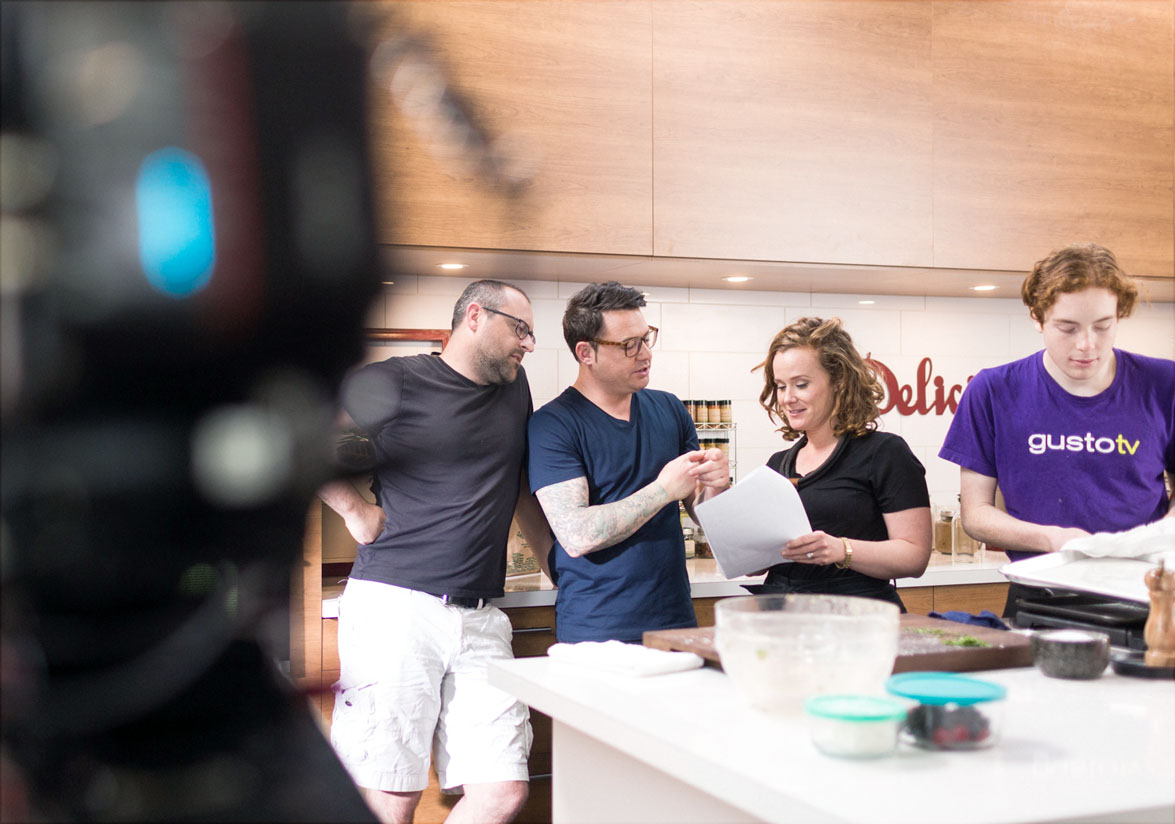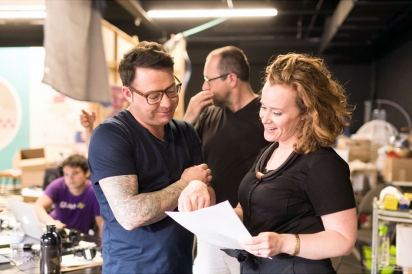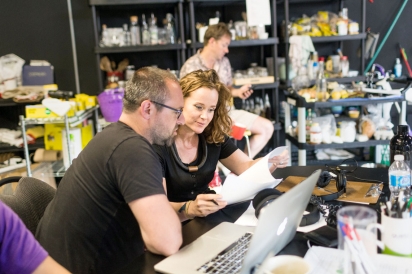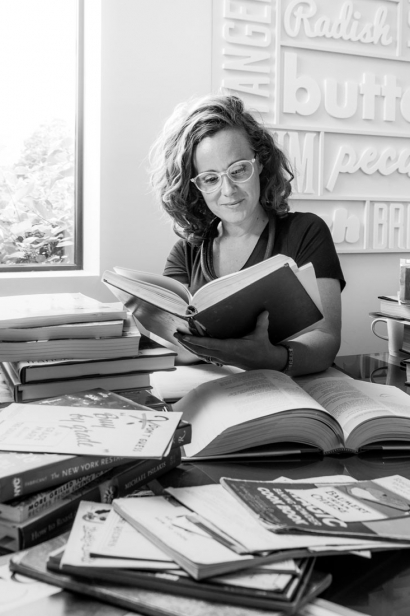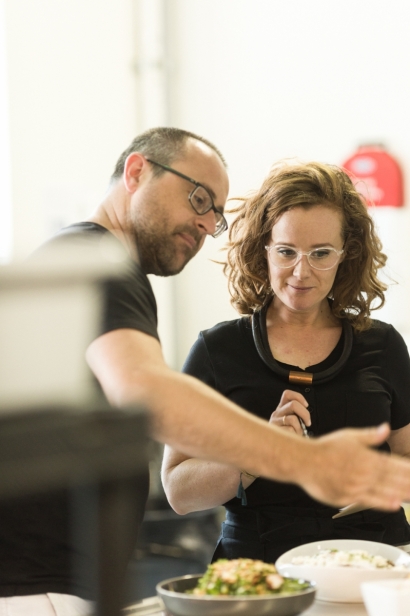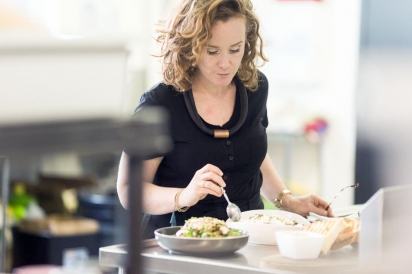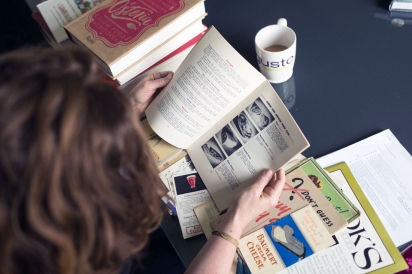Working Behind the Scenes
You’d think Amica Perrie would occasionally tire of food, but she lives and breathes it — even in her spare time.
Until very recently, she was a recipe developer and writer for Gusto TV — the Ottawa-based food and lifestyles channel that produces culinary delights such as Bonacini’s Italy, Spencer’s Big 30 and The Latin Kitchen. At Gusto, Perrie spent her days creating recipes and scripts and bobbing into the test kitchen to monitor progress on a new dish or dropping by the film studio to watch a chef whip up the latest delectable.
Instead of spending her off-hours curled up, say, with an intriguing spy novel or maybe skydiving, Perrie was pretty much on the food beat 24/7. For instance, when we met, she excitedly reported that she’d just finished savouring Elaine Khosrova’s ambitious 2016 book Butter: A Rich History. “Next up is a book on salt. That’s what I do for fun. I love this stuff.”
Surprisingly, Perrie has never studied cooking, nor was she even looking for a full-time job when she joined Gusto in mid-2017. (After this interview, she accepted a position with Lee Valley Tools — more on that later.)
A college graduate in advertising, whose ardour for food stretches back to her childhood, she logged five years in marketing at the National Arts Centre before segueing into the food sector with jobs at spots such as Rainbow Foods and eventually opening her own catering and cooking business.
Somewhere in there, she also camped out on a Paradise Island beach in the Bahamas for a few months as she studied to become a yoga teacher.
She kept her eyes and ears open along the way.
“At Rainbow, I ran the kitchen. I learned ways to cook for dietary restrictions and about packaging and economies of scale and all that stuff,” says Perrie, who was born in Perth, Ont., but raised in Ottawa.
She also jumped at opportunities, including a “fascinating” stint helping feed the cast and crew of Penthouse North (AKA Blindsided), a 2013 film starring Michael Keaton and Michelle Monaghan that was partly shot in Orléans. Both Keaton and Monaghan were healthy eaters, she reports, with a special liking for vegetables and protein, including, in the case of Keaton, quinoa.
Through a makeup artist on the film shoot, whose partner worked at Gusto, Perrie got a tip that Gusto was looking for someone with her combination of skills. “All of a sudden I was in an interview. It’s crazy how these jobs come about,” she says, giving a nod to the serendipity that has helped define her career.
The opportunity at Gusto was “dream job,” she says. It was also one that demanded a particular species of imagination.
Like her two former colleagues in the bright, cookbook-lined writers’ room at Gusto’s east-end facility — Ashley Anderson and Katherine Leyton, both of whom have a master’s degrees in creative writing — Perrie created recipes from scratch for a variety of shows.
That involved researching everything from cooking techniques to ingredients and their provenance, food facts, international cultural traditions (“Thank goodness for Google Translate!” she says).
From there, Perrie developed the recipes. She collaborated extensively with the chef for whom she was creating them. She also needed to ensure they’d look appealing — “Is it too brown?” she asks, suddenly and worriedly imagining a deadly dull plate — especially under the unforgiving eye of a camera.
Perrie then shipped the recipe off to Gusto’s gleaming test kitchen with its hulking stoves and endless array of utensils for “the acid test” under chef Nathan Bernier-Colborne. That test included taste and practicality.
“There are a lot of flowery cookbooks out there that I found confusing,” she says. Her recipes had “to work for the home cook. I love putting a recipe together and making it really clear for the average person.”
Only after a recipe has passed muster in the kitchen did it go to the filming stage. That’s when director Matt West, the props person, along with camera operators, lighting and sound technicians and others got involved, all focusing on the host in his or her studio kitchen.
“That’s when the building’s buzzing,” Perrie says. “It’s like summer camp — everyone is together.”
The day I stopped by to meet Perrie at Gusto, Spencer Watts was preparing a roasted salad dish for his show Spencer’s Big 30. The scene was what you’d expect: a darkened studio with a brightly lit kitchen at its core; folks huddled in front of screens monitoring Spencer’s progress; calm calls for “Close-up, please” and “Can we do that one more time, please, but a little slower?”
Perrie watched it all closely, a little smile occasionally tugging at the corners of her mouth as she watched her recipe in action.
Of course, that relaxed image of a dish unfolding in seemingly spontaneous fashion in the studio belies the mountain of work, detailed planning and last-minute scurrying that’s led up to what viewers see when they tune into any of these programs.
On our screens, cooking shows move fleetly. In the case of Spencer’s Big 30 and most others at Gusto, there are four dishes prepared in a half-hour episode (the premise of Spencer’s show is a meal for four prepared in 30 minutes for approximately $30).
That means Perrie had to prepare very tight scripts and the chef and crew had to work through a series of intense shoots so each episode can be completed in a single day.
“You just focus on one show and then move on to the next,” Perrie says.
Post-production is a leisurely pursuit by comparison. Working in a hushed, dimly lit room, the post-production crew edits the footage, taking up to six months to polish the film into the crisp episodes we see as the finished product.
Start to finish, the process of creating these shows is a mix of careful planning, flashes of inspiration and sheer doggedness. It’s also exemplary of the skills Perrie believes were essential in this job, including a knack for seeing the big picture while also focusing on the details, the capacity for distilling a cavalcade of diverse information into a very specific recipe and a talent, in scripts, for “escaping into the host’s voice, because if it was in my own voice it would just be really nerdy with intense food facts.”
When it all comes together, it results in recipes such as Perrie’s creation for a fruit-themed show that used jackfruit in place of the meat for a pulled pork confection or, for Watts on the Grill, a rotisserie of an entire cauliflower with butter and caraway seeds (“That was fun,” she recalls).
Food’s limitless possibilities have always underpinned her life. “I’ve found solace in the kitchen ever since I was a kid, cooking for my family, baking for my family. I was always interested in trying different things.”
She also remembers fondly how her mother’s boyfriend encouraged adventures in food, happily swapping his paintings for high-end, candlelit meals for the family.
That family relationship with good eating has continued with her husband Scott Perrie, a manager at Statistics Canada and an avid forager of mushrooms in his spare time (he and his avocation were spotlighted in these pages in 2015).
“We met on Twitter talking about mushrooms,” Perrie says. “He showed up for our first date with morels, ramps and reindeer moss. I think he proceeded to make me an omelette and now we’re married with a child (four-year-old Rowan).”
She’s since become a mushroom seeker as well — “It’s the best — a treasure hunt,” she says — and, with Scott, she found another form of foraging: discovering great little restaurants in strip malls, an unlikely combination that’s ubiquitous in Ottawa.
As to our seemingly bottomless appetite for cooking shows, Perrie says the host chef becomes a kind of avatar for the viewer. “You can put yourself there — it’s so entertaining. It’s a way of escaping and being entertained. Everyone eats and has food memories. It’s about that emotional connection with food.”
While her new job as marketing planning co-ordinator at Lee Valley Tools might not sound as though it’s related to food, her experience in the industry was a key reason she was hired. “I was hired as a market planning co-ordinator,” she says, and adds that she’s part of a team that lays the groundwork for how Lee Valley’s marketing rolls out. “There many exciting things percolating at Lee Valley — including the broadening of our kitchen category. My background in food will be a valuable asset developing our brand in new markets.”
She also says food will always be part of her life as she plans on continuing to offer writing and consulting services to the food industry. And she and her husband plan to formalize their foraging into a company she calls Wild Valley Edibles.
“Scott and I will always be involved in the industry in some capacity,” she says. “It’s how we met and, second to our family, it’s one of our greatest passions in life.”


